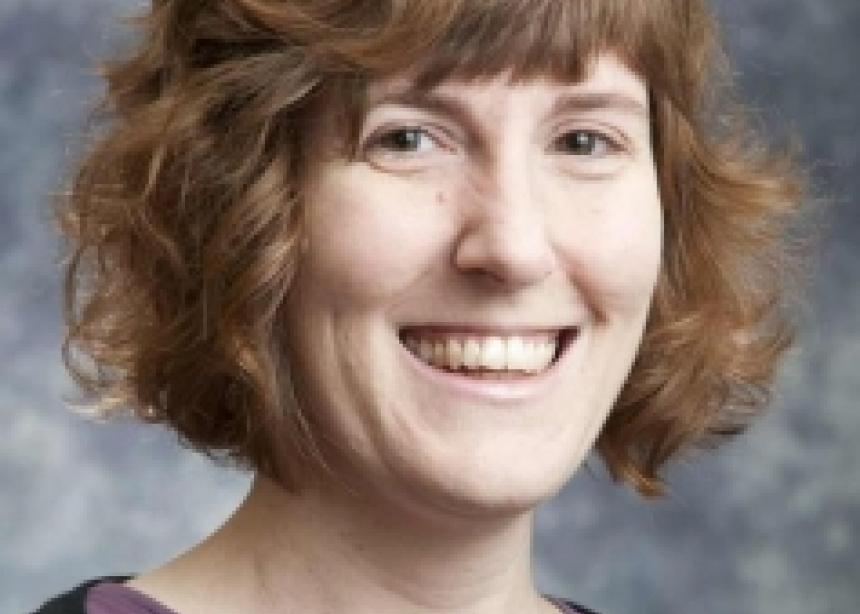The recent announcement of the completion of the John Howard Yoder Digital Library, a collaborative project undertaken by the Anabaptist Mennonite Biblical Seminary Library, the Mennonite Church USA Archives, and the Mennonite Historical Library, provoked strong reactions.
Public comment on news releases and private messages to members of the John Howard Yoder discernment group and Mennonite Church USA staff expressed anger and disappointment with the creation of the library. Some respondents suggested that this project seeks to place John Howard Yoder “on a pedestal” and undermines the work of the discernment group that has been created to work at continuing to address Yoder’s history of his abuse and preventing sexual abuse in our church.
Those of us who created and continue to administer the Yoder Digital Library have been aware of these concerns and have sought to take them very seriously in our work. In the spirit of continuing to build understanding, I would like to provide some important background information on the digital library to contextualize the project in the work of the institutional and academic repositories of the Mennonite Church USA.
Librarians and archivists of the three collaborating institutions responsible for the creation of the John Howard Yoder began work on the project in March 2012. We received a grant for $12,023 from the Indiana State Library to carry the project forward in June 2013, six weeks prior to the formation of the John Howard Yoder discernment group in August 2013. Mennonite Church USA and Goshen College contributed only existing IT equipment and minimal staff time as a required cost-share contribution for the grant.
John Howard Yoder’s unpublished and informally published writings were a logical content choice for the Indiana State Library grant for several reasons:
- Each repository involved in the grant held some, but not all, of John Howard Yoder’s unpublished and informally published writings. A digital library of these works renders them more accessible to researchers and easier for library and archives staff to manage.
- These works are in high demand by Mennonite and non-Mennonite researchers alike. While libraries and archives strive to provide convenient access to all materials in their collections, it is especially important that frequently consulted materials are made as accessible as possible – in this case, via the internet. By digitizing these collections, we are ultimately able to save on staff time and resources that go into maintaining and providing access to these materials. Also, because of their popularity, these works made a compelling “case for support” for the grant making organization.
- The John Howard Yoder family is very generous with copyright permissions and consented to our request to post hundreds of essays online. Copyright interests in unpublished materials extend 70 years past the author’s life; John Howard Yoder’s unpublished works will not enter the public domain until at least 2067.
According to the application form, recipients of Indiana State Library’s LSTA Indiana Memory Digitization Grants are “encouraged and expected to publicize the project through available and appropriate media outlets.” The grant period for this project ended June 30, 2014. Coincidentally, the discernment group issued a press release about its work on June 19, 2014. To ensure our eligibility for future grants, we complied with the grant requirements and publicized the completion of the database.
The digital library has also received criticism because its content does not include materials pertaining to John Howard Yoder’s abuse of women. The content of digitization projects is always limited by the extent of library and archival collections and copyright law. None of the partner institutions hold Yoder’s essay, “Adultery of the Heart”, in its collections, so it could not be included in the digital library.
We also sought to include the series of articles published by the Elkhart Truth in 1992 about John Howard Yoder’s abusive behavior. Unfortunately, our August 2013 request for permission to publish these articles in the digital library was never answered and the articles could not legally be added.
The librarians and archivists administering the John Howard Yoder digital library are open to including scholarly works responding to the incongruity between Yoder’s theology and behavior as part of the collection in the future. However, availability of the material, copyright permissions, researcher interest in such materials, and the availability of funding for the preparation and uploading of digital files must all be considered.
Although it seems as though digital files should be easier and less expensive to prepare and manage for archival preservation and access, the opposite is true. Scanning documents into archival formats, creating compound digital objects for multi-page documents, and uploading image and text files together (for full-text searchability) require significant staff time and resources.
It is important for the wider church to know that Mennonite libraries and archives are committed to collecting materials representing the diversity of Mennonite Church USA. The denominational archives, for example, has begun to collect and preserve Mennonite blogs, including Our Stories Untold and Young Anabaptist Radicals. Similarly, the Mennonite Historical Library has in its holdings a hard copy of Ruth Krall’s e-book, The Elephant in God’s Living Room: Clergy Abuse and Clericalism, which gives one of the most detailed accounts of the scope of Yoder’s abuse.
Ultimately, Mennonite libraries and archives exist to preserve and provide access to information resources that document the diverse, and sometimes difficult, history of our faith. It is our hope that the John Howard Yoder digital library will continue to grow and will provide access to a wide range of materials to aid the study of Yoder’s theology and life, in all its complexity.
This article originally appeared on the website of Mennonite Church USA. Used with permission.
—Posted Sept. 4, 2014
See also:
Revisiting the legacy of John Howard Yoder
Church seeks to help Yoder sex abuse survivors
Disclaimer to be included in John Howard Yoder books




Add new comment
Canadian Mennonite invites comments and encourages constructive discussion about our content. Actual full names (first and last) are required. Comments are moderated and may be edited. They will not appear online until approved and will be posted during business hours. Some comments may be reproduced in print.